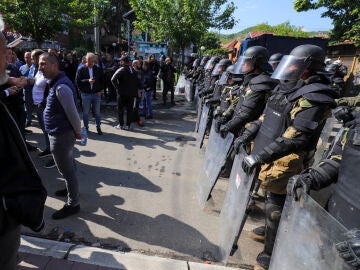
The tension continues today in the north of Kosovo after the clashes that on Monday left injured 30 NATO soldiers and 50 protesters Serbs who reject the authority of the mayors of four municipalities where they are the majority.
KFOR soldiers, the NATO mission in Kosovo, deployed this morning in front of the City Hall building in Zvecan, where yesterday violent protests took place as well as in the town of Leposavic.
Kosovo special police units with armored vehicles are also present in the area, according to local media. Groups of Serb protesters gather nearby again, among them the employees who work in the City Hall, to which they have not had access since last Friday, when the Kosovar Police forcibly broke the blockade of the Serbs to allow the passage to the mayors.
KFOR intervened yesterday with tear gas and stun bombs to contain the violent protests of the Serbs, which have left more than 50 demonstrators injured, one of them shot and in serious condition, and 30 Italian and Hungarian soldiers who suffered fractures, bruises and burns.
Serbs, a minority in Kosovo but a majority in four northern municipalities, They do not recognize the authority of the mayors, belonging to the Albanian majority of the country. They were elected last April in a vote that the Serbs boycotted and in which participation barely exceeded 3%.
The Serbs demand the withdrawal of the new mayors and special policemen from the north. The United States and the European Union have condemned the Serb attacks to international troops. Belgrade accuses the Kosovo Prime Minister, Albin Kurti, of provoking the incidents, having used special police forces against Serb demonstrators last Friday to force the entry of mayors into town halls.
Serbian President Aleksandar Vucic called on Kosovo Serbs to demonstrate peacefully and “do not enter into conflicts with NATO”. Kosovo, a former Serbian province populated by a large majority of Albanians, proclaimed its independence in 2008, which Serbia does not recognize.
Both countries are negotiating the normalization of their relations on a new plan of the European Union, supported by the United States, in a process frequently interrupted by crises and tensions.
Source: Lasexta
Ricardo is a renowned author and journalist, known for his exceptional writing on top-news stories. He currently works as a writer at the 247 News Agency, where he is known for his ability to deliver breaking news and insightful analysis on the most pressing issues of the day.












